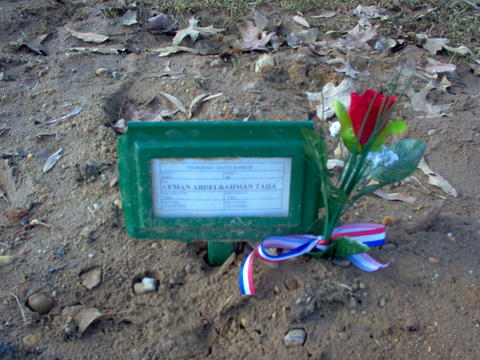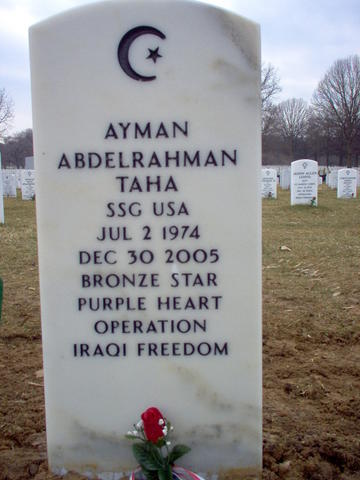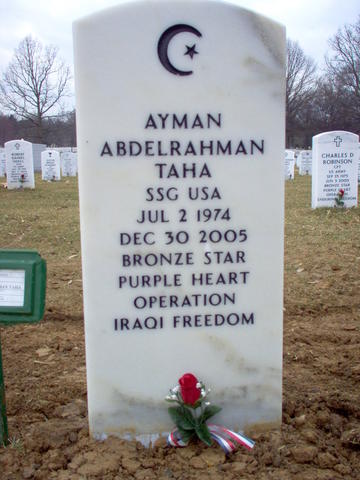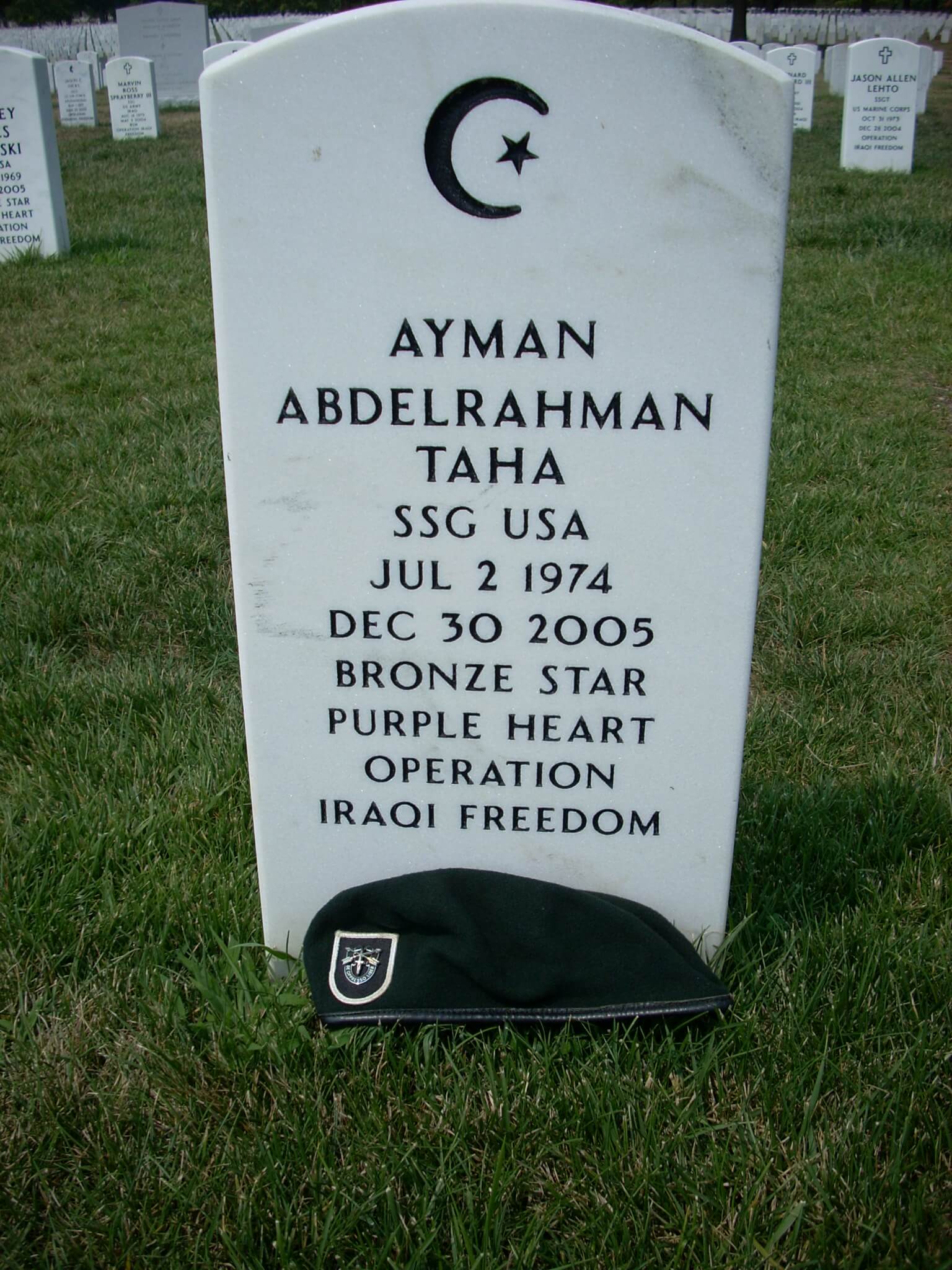NEWS RELEASES from the United States Department of Defense
No. 005-06 IMMEDIATE RELEASE
January 3, 2006
DoD Identifies Army Casualty
The Department of Defense announced today the death of a soldier who was supporting Operation Iraqi Freedom.
Staff Sergeant Ayman A. Taha, 31, of Vienna, Virginia, died in Balad, Iraq, on December 30, 2005, when he was preparing a munitions cache for demolition and the cache exploded. Taha was assigned to the 3rd Battalion, 5th Special Forces Group, Fort Campbell, Kentucky.
For further information related to this release, contact Army Public Affairs at (703) 692-2000.
Three Vienna families bury their soldier sons
By Jerry Schanke
Courtesy of Times Papers
18 January 2006
Two career U.S. Army officers and a Sudanese-born doctoral candidate and Special Forces staff sergeant, all with family ties in Vienna and all killed in Iraq, were buried with military honors in services January 12 and January 17, 2006.
Separate services were held Tuesday, January 17, 2006, at Fort Myer in Arlington for Captain Christopher Petty, 33, and Maj. William Hecker III, 37, killed January 5, 2006, along with three other soldiers when an improvised explosive device detonated near their Humvee in Najar, Iraq.
Petty, son of Kathy and Paul Petty, was buried at Arlington National Cemetery following the services. Hecker, a U.S. Military Academy graduate, was buried at West Point.
The third soldier, U.S. Army Special Forces Staff Sergeant Ayman Taha, 31, son of Abdel Rahman and Amal Ali Taha, was killed December 30, 2005, near Balad, Iraq, when a cache of explosives he was preparing for detonation exploded. A graduate of the University of California at Berkeley, Taha was a doctoral candidate in economics at the University of Massachusetts.
Taha was buried at Arlington National Cemetery January 12, 2006, following a Muslim funeral service held at the All Dulles Area Muslim Society Center in Sterling, Virginia.
Kathy Petty, speaking from her Vienna home Monday, January 16, said there would also be services at Fort Hood in Texas, Thursday, January 19, for all five soldiers killed in the Humvee attack that killed her son and Major Hecker. Petty said her son, a 1991 graduate of James Madison High School, knew Hecker and that she had met him on a trip to Fort Hood.
In addition to his parents and a sister, Lisa, Petty leaves his wife, Deborah, and two children.
Hecker, a 1987 graduate of McLean High School, is survived by his wife, Richelle, and four children.
Taha, who attended elementary school in McLean and secondary school abroad, also leaves a wife, Geraldine, and a daughter.
Serving Was Soldier’s Mission
Sudan Native Killed in Iraq Did ‘Good Deeds’
By Martin Weil
Courtesy of the Washington Post
Wednesday, January 4, 2006
Ayman Taha, a Berkeley graduate who was described as athletic, a speaker of many languages, and a friend to all who met him, had only to write his dissertation to earn his PhD, his father said.
But three years ago, Taha, a budding economist and the son of a Northern Virginia couple, Abdel-Rahman and Amal Taha, joined the Army to serve in the Special Forces. About a year ago, he was sent to Iraq.
On Friday, as Staff Sergeant Ayman Taha, 31, was preparing a cache of munitions for demolition in the town of Balad, the explosives detonated and he was killed, the Pentagon said yesterday.
It is “a very terrible thing,” Abdel-Rahman Taha said. “He was a son, and a very special son.”
The father added: “If you believe in God and you realize that this is God’s will . . . it makes it a lot easier.”
There is also consolation, the father said, in feeling that “this is something Ayman wanted to do.”
A family friend, Nada Eissa, agreed. “No, he didn’t have to do it,” she said. “This is something he wanted to do.”
Ayman Taha was born in Sudan, into an academically accomplished international family. Both parents hold doctorates. When his father worked for the World Bank, Ayman attended elementary school in McLean. He went to secondary school in England, then received a bachelor’s degree from the University of California at Berkeley and a master’s in economics from the University of Massachusetts, where he was working toward a PhD.
“He lived in many cultures,” his father said, and spoke English, Arabic, Spanish and Portuguese. More important, his father said, were his personality and character.
“If he has a five-minute conversation with you, that would be the beginning of a lifetime relationship,” the father said. “I never heard anybody who ever complained that Ayman did something wrong to him.
“He was just that type of character,” the father said.
About three years ago, Ayman Taha told his father, “Dad, I have been going to school since I was 5 years old. I want to take a break.”
The father said he suggested that his son “try something in the World Bank . . . or Merrill Lynch.” But one day, “out of the blue,” his son told him that he had signed the papers that would take him into the Special Forces.
He said his son was “definitely” patriotic and believed “in the mission.”
“He strongly agreed that what they were doing is good and that they were helping people in the Middle East to get out of the . . . historic bottleneck” that had confined them.
Since boyhood, those who knew him recalled, Ayman Taha had taken an interest in military matters, which showed itself in the books he read and the toys he played with.
Joining the Special Forces was “something he felt compelled to do,” said a friend, Hisham Eissa, who lives in Los Angeles and is Nada Eissa’s brother.
In economics, Taha’s interest was in development. “He felt very strongly about making a difference,” and “I think he felt that people like him” were needed for it, Eissa said.
“Everyone whose life he touched loved this guy,” Hisham Eissa said. “There isn’t a single person who knew him who isn’t torn up about this.”
The Pentagon said Taha was assigned to the 3rd Battalion, 5th Special Forces Group, based at Fort Campbell, Kentucky.
His wife, Geraldine, and child Sommer live near the base. One sister, Rabah, is a special education teacher in Fairfax County, and another, Lubna, attends Marymount University.
His father said Taha was a devout Muslim who believed that “the message of Islam is very simple . . . to believe in God and do good deeds.”
“He believed that what he was doing were the good deeds Islam is asking for.”
Vienna Man Killed in Iraq
Loved ones remember Ayman Taha, who studied economics before joining the Army Special Forces.
By Mike DiCicco
January 11, 2006
Courtesy of the Connection Newspapers
Ayman Taha was close to earning his PhD in developmental economics because he was “interested in the world and in developing countries,” said his father, Abdel-Rahman Taha, of Vienna. Three and a half years ago, he decided to put that interest into practice in a way that surprised his friends and family — he joined the Army Special Forces.
After serving for about a year in Iraq as a Special Forces engineer, Taha, 31, was killed on December 30, 2005, when an enemy munitions cache he was preparing for demolition exploded, according to a Special Operations Command press release.
Those he left behind say they remember a young man with many interests, talents and friends.
“He combined the athletic, the intellectual and the literary,” said his father. “So he was a very versatile person.” He said his son played “almost every sport you can imagine,” from basketball when he was young to baseball in high school to soccer, which he began coaching at the high school level while he was an undergraduate. He also trained in the martial arts, said his father.
“He was really into it for a while. He trained a lot,” said Taha’s friend Hisham Eissa, of his martial arts interest.
“He taught me everything I know about photography,” he added. “Any interest I have in it came from him.” Eissa said he had known Taha since such early childhood he could not remember meeting him.
Taha’s father also mentioned that his son played the guitar and was “an avid reader of everything.” He noted that while in Iraq, Taha managed to keep up with the U.S. newspapers.
HE ALSO SHOWED a keen interest in his religion of Islam. “The majority of Muslims may know a few of the verses and prayers,” said his father, “but, like everything else he does, he studied [the Koran] in both English and Arabic, and he really learned it.”
Taha spoke several languages, partly because he lived in many cultures.
Born in Sudan, he arrived in the area with his family as a child and attended Kent Garden Elementary School in McLean, said his father. His secondary school years were spent in Kuwait and Britain, and he majored in economics at the University of California at Berkeley and earned his Master’s in the subject at the University of Massachusetts.
He enjoyed traveling, his father said. He lived with Brazilian roommates at Berkeley, with whom he traveled to Brazil and put to use the Portuguese he had learned while minoring in the language as an undergraduate. He also stayed in Italy with an Italian friend and picked up some Italian.
“He loved to travel and meet new friends and new people,” his father said.
His father also recalled that since childhood he had shown an interest in the military, from military toys to books and movies about war to wearing fatigues. “Somehow, the military was in him,” he said.
Nonetheless, friends and family had a hard time understanding his decision to throw himself into this particular interest, although they know he considered himself specially qualified for the war in Iraq because of his knowledge of the Arabic language and culture. Indeed, this was why he was accepted directly into the Special Forces.
To his wife, Geraldine January, who did not meet him until after he was enlisted, the question seemed simpler.
“He always said, ‘I want to make a change. I want to be someone who does something about it,'” she said. “He was a very positive person, and he took world affairs seriously. He believed he could change things and be a part of history.”
So throw himself in he did.
“I talked to some of his colleagues, and they all said he was a first-class soldier and he did everything to perfection,” said his father, pointing out that Taha had reached the rank of staff sergeant after only three and a half years. “His colleagues tell me it is a remarkable achievement,” he said.
“He always talked about how much he loved his job, how much he loved his team, how much he loved the guys he worked with,” said January.
His death, said Eissa’s sister Nada, “is a little easier for all of us to accept because he was doing what he wanted to do.”
“HE WAS A REMARKABLE man,” said his father. “Even when he was young, he was very rational and calm. He never got into any trouble.” He also said his son could “instantly strike a friendship” with anyone he met.
“I’ll remember him like a brother,” said Hisham. “He was a loyal, intelligent, very caring person.” He said Taha had affected many lives.
“He has friends in all different parts of the world of all ages, and he managed to touch people’s lives in all different ways,” said Nada.
Taha and January met in May of 2004, and, she said, she knew immediately that he was someone special. “He was a very unassuming guy, very down-to-earth. He had a very humble spirit,” she said. “But most of all, he was very intelligent and articulate. And he did everything with honor.”
By August they were married.
She said she remembers him having “this brilliance and exuberance about him that touched everybody in a very special way” and “a very sensitive heart toward people’s problems.”
“He is a hero,” she said, “and he put his life on the line for something he believed in.”
Ayman Taha is also survived by his mother Amal, his sisters Rabah and Lubna, and his 8-month-old daughter, Sommer.



Michael Robert Patterson was born in Arlington and is the son of a former officer of the US Army. So it was no wonder that sooner or later his interests drew him to American history and especially to American military history. Many of his articles can be found on renowned portals like the New York Times, Washingtonpost or Wikipedia.
Reviewed by: Michael Howard

